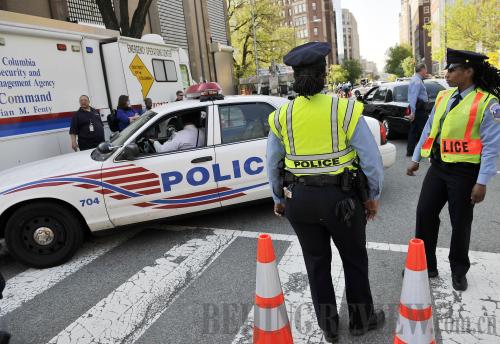|
 |
|
COURTESY OF LIU CHONG |
It was an unprecedented gathering. On April 12-13, the first ever Nuclear Security Summit was held in Washington, D.C., where representatives from 47 nations—mostly heads of state—convened to address one of the most serious and pressing issues facing the world today.
A subsequent communiqué and accompanying work plan revealed a powerful consensus regarding many aspects of non-conventional nuclear threats and how best to deal with them.
These and other aspects of the meeting, meanwhile, left little doubt that the issue of nuclear security, along with the means to combat nuclear terrorism, will be hot topics well into the future.
An initial success
 |
|
SAFE VIEW: Police officers stand guard outside the Nuclear Security Summit in Washington, D.C. on April 12 (ZHANG JUN) | The concept of nuclear security focuses on combating nuclear terrorism, in particular, protecting nuclear materials and preventing nuclear smuggling.
In recent years, the boom in nuclear power development has increased the possibility that terrorist organizations can access nuclear materials.
Amid rapid gains in global logistics and technology—not to mention the ever-expanding domain of the Internet—preventing the leakage of nuclear technology and the smuggling of nuclear materials and equipment is more challenging than ever. But, nations possess different stances toward nuclear security.
In the United States, the two major parties—the Republican Party and the Democratic Party—have reached a consensus attaching great importance to the threat of nuclear terrorism.
The U.S. National Security Strategy issued under the Bush administration in 2002 pointed out that the gravest danger the United States faces "lies at the crossroads of radicalism and technology."
Shortly after assuming office, U.S. President Barack Obama announced "a new international effort to secure all vulnerable nuclear material around the world within four years" during a speech in Prague in April 2009.
In addition, he drastically raised the nuclear security-related budget. In Fiscal Year 2011, he raised the budget for the Cooperative Threat Reduction program by 30 percent over the previous fiscal year. The program aims to assist former Soviet states in controlling and protecting their nuclear weapons, weapons-usable materials, and delivery systems. Obama also increased the budget for the Global Threat Reduction Initiative, aimed at strengthening the security of nuclear materials worldwide, by 68 percent over Fiscal Year 2010.
Nonetheless, the international community has yet to reach a full agreement on the urgency of nuclear terrorism threats. Some nations have not placed it at the top of their agendas. Some suspect the United States seeks to assert control over their nuclear arsenals.
Others still, especially major developing countries, are concerned the United States may use the opportunity to restrict their right to develop nuclear fuel cycle technologies. So they have remained vigilant against its promotion of nuclear security cooperation.
Just as former U.S. Ambassador to the International Atomic Energy Agency (IAEA) Gregory Schulte said, some countries contended the United States and its allies had exaggerated the threat of nuclear terrorism and deemed it barely possible for terrorists to produce dirty bombs, much less nuclear weapons. But even if terrorist organizations really wanted to make nuclear weapons, he added, many nations think it would only be a threat for the United States, and they did not have to join in.
This was impetus for the United States to hold the Nuclear Security Summit—an event Obama said is essential for future international nuclear security cooperation.
Not surprisingly, the communiqué itself was emblematic of the event's success.
While defining nuclear terrorism as "one of the most challenging threats to international security," it also underscored the fact that a full consensus between the United States and other nations has yet to be achieved.
The 2010 Nuclear Posture Review issued by the United States in early April defined nuclear terrorism as "today's most immediate and extreme danger."
It is worth noting that the communiqué associated nuclear terrorism with the words "most challenging." This was a step forward compared with language in previous international documents.
But it also acquiesced in the differences in security perceptions of various nations by adding the conditional expression "one of" before it. In other words, it agreed that there were other major security threats in the world.
In any case, the communiqué itself has laid a solid foundation for future international cooperation, while proving an initial success for President Obama's nuclear security diplomacy.
| 